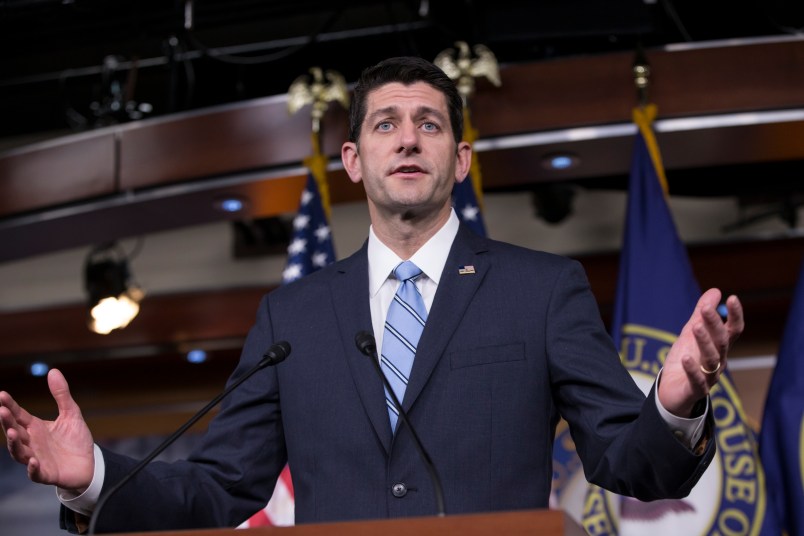On Friday, House Republicans passed a budget resolution 227 to 198 that will go on to be their vehicle to repeal the Affordable Care Act – moving them one step closer to realizing a political goal nearly seven years in the making.
But while Republicans have voted to repeal Obamacare dozens of times before, this time is very different. There is no President Barack Obama to veto their efforts, no Democratic Senate to stop them. And, for the first time since the ACA was passed in 2010, the stark reality of what is at stake – 20 million people who have insurance because of Obamacare– seems to have sunk in.
“There’s a lot of people I think who said they wanted to do it when they knew that it wouldn’t happen and now that there’s a real potential, obviously with the House and the Senate and the President and reconciliation, there is a little more concern with how it’s done,” said Rep. Scott Perry (R-CA). “Some people when … they didn’t think it meant anything, it was easy and they didn’t think about the fact that it actually could happen and that’s unfortunate.”
When Republicans entered this week the plan was as follows: The House and Senate would pass budget resolutions to begin the process of repealing Obamacare through a process called reconciliation, which only requires a simple majority to pass in the Senate. Then, the committees would go to work to repeal the law fast. Only after a two or three year transition would Republicans be forced to pass a replacement.
House Ways and Means Chairman Kevin Brady (R-TX) told TPM that some members were surprised “a bit” by how complicated the process was.
“Only because health care’s complicated, which is why the approach of taking a step-by-step approach, no 2,000 page bill like Obamcare did, no do it in the middle of the night, which is what the Democrats did, but taking it step by step,” Brady said.
Others told TPM that behind the scenes, rank-and-file members were deeply uncomfortable with the initial strategy.
“I think we need more information. That would be very helpful,” said one Republican senator who spoke on background about his unease with leadership’s strategy earlier in the week.
“A lot of us have concerns about initiating this process until we get a better sense of the overall plan,” said Rep. Charlie Dent (R-PA).
“Many of us have concerns about repealing and delaying the decision on what a replacement would look like,” said Sen. Susan Collins (R-ME). “That creates tremendous anxiety and uncertainty for those who are receiving insurance through the exchanges .”
The House Freedom Caucus announced Monday night that they wanted to see Republican leadership’s plan for a replacement before they voted for a budget reconciliation bill and a handful of Senate Republicans introduced an amendment –their message to leadership– that they wanted to delay the repeal bill until the party came up with a clear replacement.
What unfolded over the week was a quick shift in strategy. Instead of running the play to quickly repeal Obamacare and replace it down the road with some unknown plan – a combination of factors not the least of which was rank-and-file heartburn and a tweet from the President-elect urging caution– left Republican leaders announcing this week they would unveil their plans for replacement much closer to the repeal process than first envisioned.
“We already showed people what we believe in — what ObamaCare should be replaced with — so we’re going to use every tool at our disposal, through legislation, through regulation, to bring replace concurrent along with repeal so that we can save people from this mess,” Ryan announced Tuesday.
One Republican senator said they felt comforted by the change in direction.
“People worried about the politics of it and how it played out. All of that has fed into it and realizing this could be our baby now,” the senator said on the condition of anonymity to speak freely about the shift.
At the moment, it seems that while leadership is clearly calling the shots on the process, the wider Republican conference is having a immense amount of influence.
“I don’t think these concerns are just being held by one person. I think it’s on both sides of the Capitol,” said Sen. Bob Corker (R-TN). “I think the administration that is coming in is also thinking about those same things. Our leadership’s been a little more vague, but we know there are concerns on the House side, I know there are concerns with multiple people from the incoming administration. Over here, it’s just been a little more vague about where we are going.”
In the end, Republicans managed to overcome their first hurdles to repeal Obamacare this week, passing measures in the House and Senate that set the stage for repeal. But, there is still so much more to do. Republicans will have to write the actual repeal instructions. Then, they still do have to come up with that long-promised replacement, and members are already beginning to try and sell their own plans.
“I think everybody understands that what leaves the station here this week is not particularly relevant,” Corker said, “it’s what pulls back into the station and whether we’ve thought it through.”









